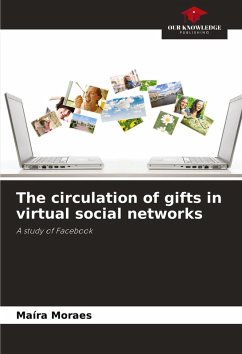In his 'Essay on the Gift', Marcelo Mauss suggests that industrialised societies could benefit from recognising a model of social practice based on gifts and donations, like the gift exchanges of archaic societies: a social practice that is less utilitarian and more focused on the bonds between human beings, the construction of a 'group morality', 'gift-exchange morality'. The author believes that the obligation to exchange is the basis for a system that tends to stabilise itself, and points out that in the societies studied, individuals were 'less serious and sad'. The interface with which Facebook presents itself to social network users is based on the logic of the gift system, reinforced by the manifesto 'it's free and always will be'. This is the sphere we explore in this paper. However, it is important to note that this system can only be sustained by the coexistence and engendering of other logics, such as capital, profit and surveillance, a theme explored in other studies written later.
Bitte wählen Sie Ihr Anliegen aus.
Rechnungen
Retourenschein anfordern
Bestellstatus
Storno








